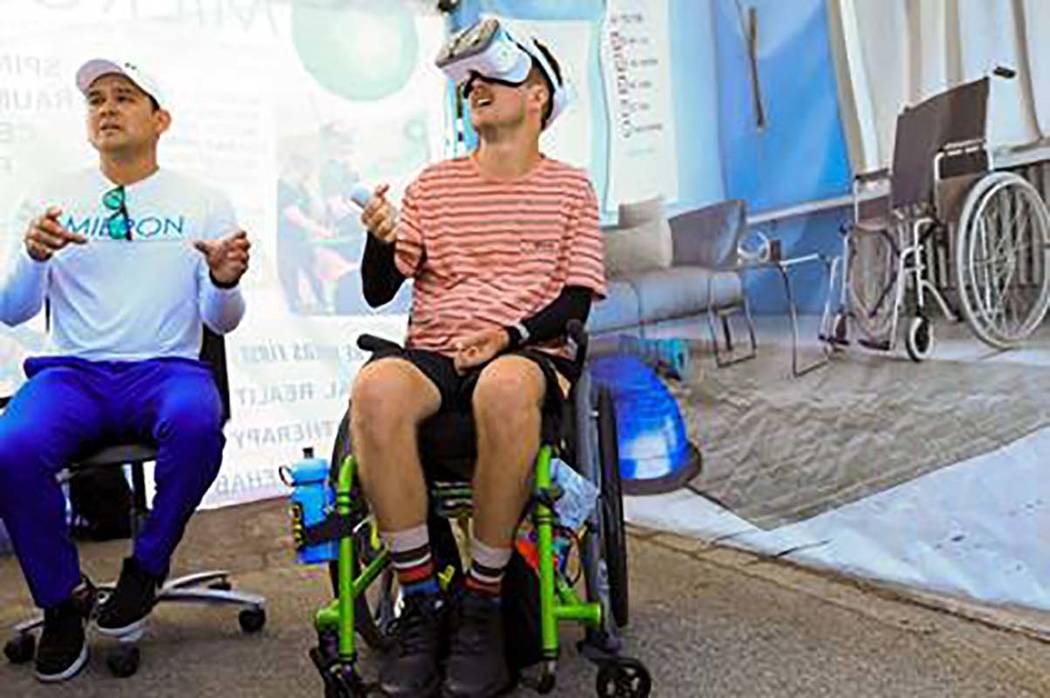Nevada native’s VR startup could revolutionize brain, spinal rehab

Virtual-reality technology pioneers Josh Dubon and Jessica Maslin got a life-altering phone call two and a half years ago.
A mural artist they recently worked with told them his young niece was at a rehab hospital after a freak accident left her paralyzed from the waist down. Could they help?
Dubon, a Nevada native, and Maslin spent the next two weeks in Louisville, Kentucky, where 6-year-old Eden Hoelscher was receiving treatment. By working with medical practitioners to incorporate virtual reality into her rehabilitation, they found that Eden could do more with less pain and emerge from a treatment session with “an ear-to-ear smile,” said Dubon, who grew up in the Reno-Lake Tahoe area.
With that, their careers pivoted. “It was so much bigger than her (Eden) and so much bigger than all of us,” said Dubon, 31.
Thus Mieron VR was born. The Long Beach, California-based company is one of five winners of the CES 2020 Eureka Park Accessibility contest, which recognizes startups designing technology to benefit older adults and people with disabilities.
Mieron is exhibiting this week at CES, the gigantic tech trade held each year in Las Vegas. It’s part of the Eureka Park exhibition, “the most influential startup event on the planet,” where investors come “to find their next unicorn,” according to information provided CES.
Its product for home use provides a library of VR neurotherapy exercises such as upper body mobility, core stability and gait training. The exercises are designed to make rehabilitation fun — and more effective, said Maslin, 32.
A patient wearing a VR headset can do a balloon-popping exercise that “promotes reach and lateral movements.” Some of the exercises are animated. Others are in the middle of a galaxy or prehistoric setting. For gait-training exercises with an assisted walking device, the patient can be “taking a snow stroll in Tahoe” or walking on a beach.
With VR, the perception of pain is lowered, which has allowed patients to be more engaged in their rehabilitation and to break through self-imposed limitations, said Maslin, whose background is in medical research.
Mieron products are being used with patients with spinal cord and traumatic brain injuries and neurological diseases such as Parkinson’s.
The products were introduced in October at Craig Hospital in Denver, a renowned rehabilitation facility for spinal cord and brain injury.
“We’ve seen some excellent improvements in range of motion” and significant decreases in pain perception, said the hospital’s Dr. Jeff Berliner.
In the virtual world, patients “don’t have that turn-off switch that says, ‘I can’t move my hand to the next level,’” he said. They are unable to do exercises they find “too painful or daunting” without the virtual reality experience.
“What we’re seeing clinically I’d like to have some data behind,” said Berliner, who has joined Mieron’s advisory board and is working to document the technology’s results.
Berliner sees an “important place for virtual reality in the future” for patients with spinal cord injuries.
Dubon said, “We believe we can change the world by utilizing this technology to help others.”
^
Contact Mary Hynes at mhynes@reviewjournal.com or 702-383-0336. Follow @MaryHynes1 on Twitter.